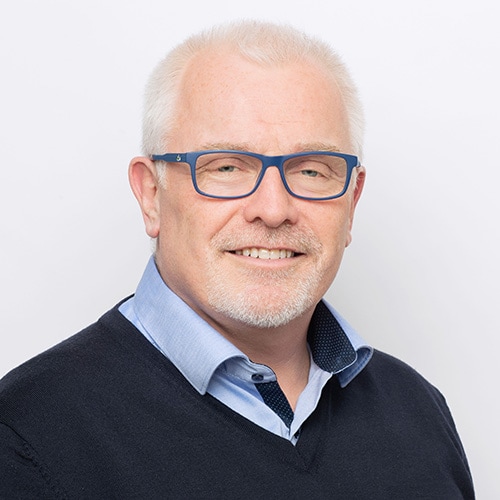

“We’re a high-growth, profitable business and we fish in a good pond, but none of this means that we can rest on our laurels.”
Marc Murphy | CEO of Fenergo
“Deep subject matter expertise and the ability to speak about complex topics in a simple, accessible way is a unique strength. When those two things collide, you can demonstrate an understanding of your customer’s domain and you often end up at the top of many teams as a result.”
For Marc Murphy, CEO at Fenergo, his talent for speaking about his work was evident from his college days when he studied software engineering at DCU. His fellow students routinely put him forward to do the talking during in-class assignments, and this skill spilled over into his early career to great success. But it ultimately led him to a fork in the road.
“I’ve been able to go into great depth with both the CIO and the non-technical head of an institutional bank, for example, and that’s where a lot of power comes from,” he said. “Very quickly in my career, I was the voice of the company and the one getting the calls. After a while, I had to ask myself: ‘why am I doing this for someone else when I could do it for myself?’”

“It was the worst possible time to open a business of that nature. Banks wanted to close accounts, not open them.”
— Marc Murphy
A tough start
So in 2008, Fenergo was born to help banks open new customer accounts. But given the prevailing winds in the banking industry at the time, the company had to pivot before it even had time to get up and running. “In one sense, it was the worst possible time to open a business of that nature. Banks wanted to close accounts, not open them,” Marc said. “But businesses born in recessions are typically the ones that survive because the trading environment is so tough, and it forced us to be lean from the get-go.”
According to Marc, his business is now both recession-proof and sticky. “Today, we focus on three offerings in the know your customer, anti-money laundering and client lifecycle management spaces: operational efficiency, digital transformation and regulatory services,” he said. “We’re a high-growth, profitable business and we fish in a good pond, but none of this means that we can rest on our laurels.”
While challenges abound in our increasingly uncertain economic environment, Marc remains focused on the things that are within his control. “Rising interest rates had to happen and you can see that starting to soften but if I look at our physical footprint, for example, we have 20-40% occupancy on any given day due to our flexible working model. That’s here to stay so in the future, my approach will be to look for more upmarket space, but a smaller amount of it.”
The developments in the technology industry are also positive for Fenergo from a staffing perspective, he said. “We’ve been competing with elevated salaries in the tech sector for some time now. We have 100 roles open at any given time so the change in tone when it comes to salary demands, particularly for graduates, is definitely welcome.”

“Going public will remain an option, but would I go public tomorrow? Absolutely not.”
— Marc Murphy
Lessons learned
While cost control is a prudent strategy, it isn’t an end in itself for Marc. Despite a false start in 2022, an IPO remains an option for the business. “We nearly went public last year through a SPAC, but I’m glad we didn’t,” he said. “For now, the focus is on building a great business and putting another brick on the wall every day. Going public will remain an option, but would I go public tomorrow? Absolutely not.”
Despite this, Fenergo acquired Sentinels—a Dutch anti-money laundering transaction monitoring company powered by artificial intelligence—in April 2022. For Marc, the acquisition process was a steep learning curve. “It was my first acquisition and I’m delighted with the product and team,” he said. “But if I were to do it again, I’d take what I’ve done over the past ten months and do the opposite.”
In hindsight, Marc believes he was too slow to integrate Sentinels into Fenergo, which led to costly complications. But some sharp advice from the serial acquirer, AMCS CEO Jimmy Martin, put Marc on the right track. “Having listened to Jimmy and a few others, and with the benefit of my own experience, I would close the deal on day one, have all the leaders from the acquired business report into Fenergo on day two, centralise the operations and strip out unnecessary costs on day three, and sunset the brand on day four.”
He added, “I let them keep the brand and keep the team. I was basically too nice and slow, but if I go for another acquisition—and I probably will this summer—I’ll have learned some valuable lessons.”
Raise the bar
Having transitioned from student to software engineer to entrepreneur and CEO, Marc has learned many lessons on his journey. But the one that sticks out most clearly came from his investors.
“They told me to hire better,” he said. “At one point, my CFO and COO retired and I had what I thought were good replacements, but my investors told me to go again. They did that three or four times and I was getting quite frustrated by this, but we ended up with absolutely fabulous people.
“I’ve had to raise my bar and they’ve taken a lot of work off my desk, which leaves me with more time for strategy, acquisitions and—of course—speaking with existing and potential clients.”

Ciarán Kelly
Partner, PwC Ireland







Menu